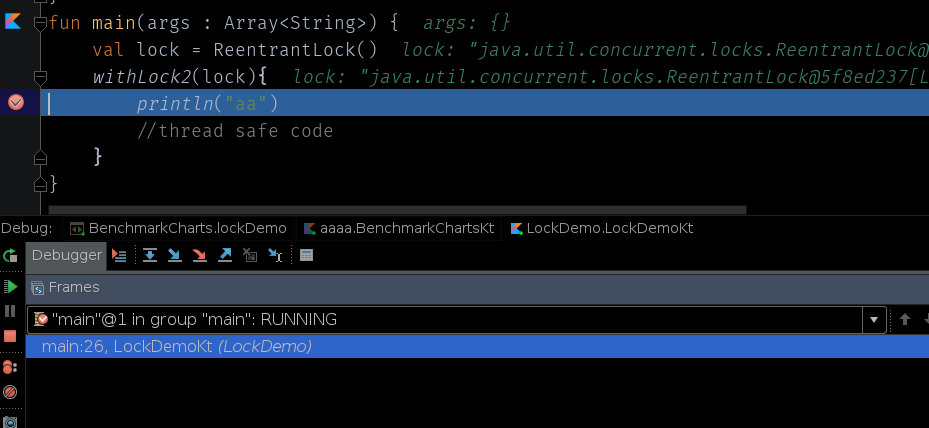Kotlin vs Java - Lambdas and Locks
A few months ago ago I wrote post named Scala has weakly typed syntax. I should expand it a bit: Scala is excellent language, but Kotlin is far better. When comparing Kotlin to other languages, you only see nicer syntax. But Kotlin really shines, once you start using for daily tasks, I programmed in Kotlin for 3 years. So I am starting small blog series, to describe less known advantages of Kotlin programming language. All articles from this series are available under Kotlin tag.
Locking within try-finally
Locks (and other resources) are usually handled within try..finally block. In java:
Lock lock = new ReentrantLock();
lock.lock();
try{
//thread safe action
}finally {
lock.unlock();
}
This works reasonably well. It is easy to refactor old (thread unsafe) code to use this new construct.
But it is easy to introduce errors, for example if a different lock variable is unlocked, or ReadWriteLock unlocks readLock instead of writeLock…
One way is to wrap thread safe code into lambda, and specify lock only once.
It would be nice to have withLock directly on Lock interface, but maybe in Java 9. In Java8 we have to specify our own method which takes lock and lambda:
public static void withLock(Lock lock, Runnable block) {
lock.lock();
try {
block.run();
} finally {
lock.unlock();
}
}
Lock lock = new ReentrantLock();
withLock(lock, () -> {
//thread safe action
});
It works, lock is specified only once, but this creates some new problems:
New
Runnable(lambda) is allocated on every invocation. I do not think that is a problem for modern JVM with good GC.Lambda invocation inside method adds three new stack frames. That is big overhead, and it prevents JIT.
It breaks local context; because lambda is executed somewhere else, one can not return from method or continue local cycle.
Extra stack frames complicates debugging and obscures error messages:

Try finally in local frame
Things get complicated once you need more than code wrapping. Lets take simple getter:
public String getName(){
lock.lock();
try{
return name;
}finally{
lock.unlock();
}
}
We can not use simple Runnable lambda, this does not compile:
public String getName(){
withLock(lock, () -> {
return name; // << compilation error
});
}
We can use Callable to return value from lambda:
public static <V> V withLock(Lock lock, Callable<V> block) throws Exception {
lock.lock();
try {
return block.call();
} finally {
lock.unlock();
}
}
public String getName() throws Exception {
return withLock(lock, () -> name);
}
And if you nest multiple locks, things get hairy pretty quickly:
public String getName() throws Exception {
return withLock(lock, () -> {
return withLock(lock2, () -> {
return name;
});
});
}
Behold the power of Kotlin inline!
Now lets see what solution Kotlin offers to for this problem (but Java developer would not even see it as a problem ;) ).
Kotlin has inline methods and inline lambdas. I recommend you to read the chapter, to get some theory. But in short:
Kotlin can inline
withLockmethod into our code, so noRuntimeis allocated and no extra stack frames are addedInline is type safe, compiler will fail with an exception, if method can not be inlined for some reasons (dependency…). So no nasty performance surprises.
Compiler actually works, inlined code is executed within local stack frame. We can do non-local
returns. For future there is even planned support forcontinueandbreakfor loops in parent function.,
Here is first Kotlin example, simple withLock method. Kotlin already provides extension method on Lock interface:
val lock = ReentrantLock()
lock.withLock {
//thread safe code
}
But to keep things comparable, lets implement similar method from Java:
inline fun <T> withLock2 (lock: Lock, body: () -> T): T {
lock.lock()
try{
return body()
} finally {
lock.unlock()
}
}
val lock = ReentrantLock()
withLock2(lock){
//thread safe code
}
Here is proof from debugger that this method and lambda are both inlined, and do not add any new stack frame:

Another nice feature is non-local return. You can put return statement inside inlined lambda. Because it shares the same stack frame with parent method, you can exit parent method from within lambda:
fun getName():String {
lock.withLock {
return name2 //return from getName()
}
}
You can also nest multiple inline methods, all gets inlined into single frame. This example uses two nested locks:
fun getName():String {
lock.withLock {
lock2.withLock {
return name2 // returns from getName()
}
}
}
In next post I will mention that return from lambda also works on collection methods:
// taken from kotlinlang.org
fun hasZeros(ints: List<Int>): Boolean {
ints.forEach { //this is inlined lambda
if (it == 0)
return true // returns from hasZeros
}
return false
}
Comments
Vladimir Dvorak • 3 years ago
I’m not advocate of Java, but what about make custom Closeable Lock in java?
–
jefferygriffith • 4 years ago
Thanks for the post - I hope you’ll write about concurrency in Kotlin in your new series! Lots of options with a/w, CompletableFuture, rx, etc and would appreciate your experience.